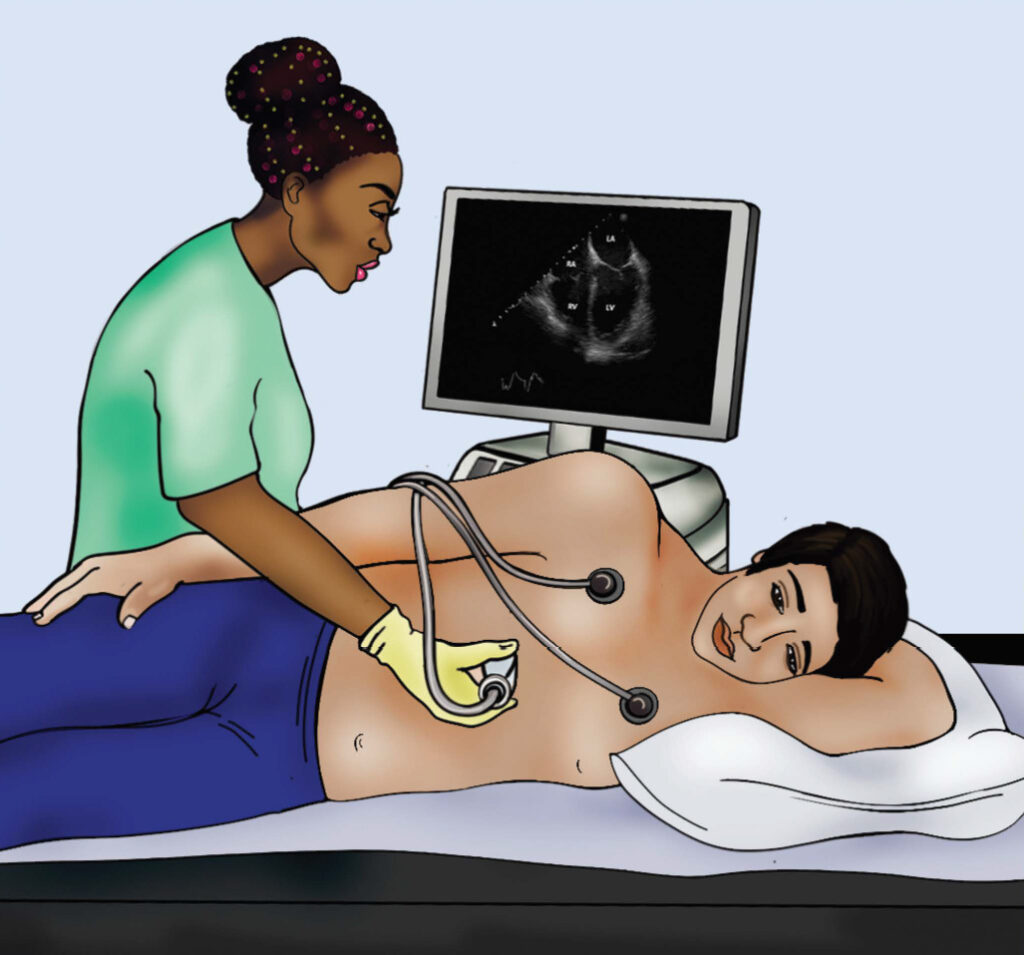What are heart valves?
There are four valves in the heart. They allow blood to be directed around the heart and when working normally ensure the blood flows in one direction. They open and close with every heartbeat – that’s 100,000 times a day!
Heart Valves

What is a murmur?
A murmur is the sound blood makes as it travels through a valve which is thickened or leaking.
What is the aortic valve?
The aortic valve is the main outlet valve of the heart which allows blood to exit the heart with every heartbeat. Normal aortic valves have three leaflets. Around 1 in 200 people are born with an abnormal heart valve which has two leaflets, known as a bicuspid aortic valve.
What is aortic stenosis?
Aortic stenosis is a condition where the aortic valve becomes thickened or calcified (bony) and is less able to open. As a result, the blood flow across the valve is abnormal and means that a heart murmur can be heard when your heart is listened to by a stethoscope.
What causes aortic stenosis?
The most common cause of aortic stenosis is age-related degeneration (wear and tear) and as a result most people who have the condition are over the age of 60.
In people born with an abnormal ‘bicuspid’ valve, the valve can become thickened at a younger age, and people with an abnormal bicuspid valve can be affected at any stage in their lives.
Sometimes in addition to being narrowed (aortic stenosis), the aortic valve can also leak (aortic regurgitation). Patients with both narrowing and leaking have a condition called mixed aortic valve disease.

What are my treatment options?
Aortic stenosis is a chronic (long term) condition. It can be graded into three categories; mild, moderate and severe.
Mild or moderate aortic stenosis do not usually cause symptoms or any strain on the heart.
Regardless of the severity of aortic stenosis, if you have no symptoms, it is likely that the Heart Valve Team will keep you under review with a clinic visit and echocardiogram (echo or cardiac ultrasound) intermittently as the valve disease can progress. Patients with aortic stenosis are often followed up for many years without any symptoms. Follow up intervals will be determined by the Valve Team looking after you and depends on the severity and progression of your aortic stenosis. Mild aortic stenosis usually only requires very intermittent monitoring.
There are different clinics including nurse-led, sonographer clinic or doctor-led. You will be advised which clinic to attend. There will always be opportunities to ask about your condition.
If you have severe aortic stenosis (severe narrowing) and you have symptoms then you may be referred for aortic valve replacement, which can be performed as either open heart surgery or keyhole valve replacement (TAVI).
Symptoms of heart problems
- Increasing shortness of breath (especially on exertion or when lying flat)
- Chest pain or tightness
- Blackouts/feeling light headed (especially on exertion)
- Difficulty exercising
- Unexplained sweats or fever
Is aortic stenosis associated with any other conditions?
In patients with a bicuspid aortic valve, there can also be abnormalities of the aorta, and sometimes in addition to undergoing a regular echocardiogram you may also undergo regular CT or MRI scans.
What tests will I need?
Most people with aortic stenosis will have an echocardiogram and ECG. Other tests outlined below may also be performed.
CT scan
Lying flat on a table, you pass through a large hoop which takes detailed x-ray pictures of the heart. The test involves an injection. The test itself takes just a few minutes to complete.
Echocardiogram (Echo or cardiac ultrasound)
During the test an ultrasound probe is placed on the chest and moving pictures of the heart are produced. The test takes around 30 minutes.

Angiogram
This is an x-ray dye test of your heart arteries performed under local anaesthetic.
Cardiopulmonary exercise (CPX) test
An exercise test performed on the treadmill or bicycle to assess how your heart and lungs respond to exercise. You will be asked to exercise wearing a mouthpiece and your heart and blood pressure will be monitored.
Lifestyle
As with any type of heart disease, it is important that you follow a healthy diet and keep your weight within a normal range.
Smoking
If you smoke, it is advisable that you stop. Your GP can guide you to support available to help you stop smoking.
Exercise
For most patients there is no limitation for exercising. You can discuss this with your healthcare professional.
Pregnancy
If you are planning to get pregnant you should discuss this with your healthcare professional first and let them know immediately if you become pregnant.
Endocarditis
Bacteria can enter the blood stream via many sources, most commonly the mouth and skin. In patients with abnormal valves these bacteria can attach to the heart valves causing infection known as endocarditis. It is therefore important to take good care of your teeth by brushing your teeth twice a day and visiting your dentist for regular check-ups (at least once a year). If you have toothache or an abscess it is important that you get treated for this quickly. Make sure you tell your dentist you have a heart valve condition.
Symptoms
If you experience any new symptoms in between clinic appointments then it is important that you let your healthcare professional know.
Call the valve nurses on 0113 392 5298 if you develop:
- Increasing shortness of breath (especially on exertion or when lying flat)
- Chest pain or tightness
- Blackouts/feeling light headed (especially on exertion)
- Difficulty exercising
- Unexplained sweats or fever